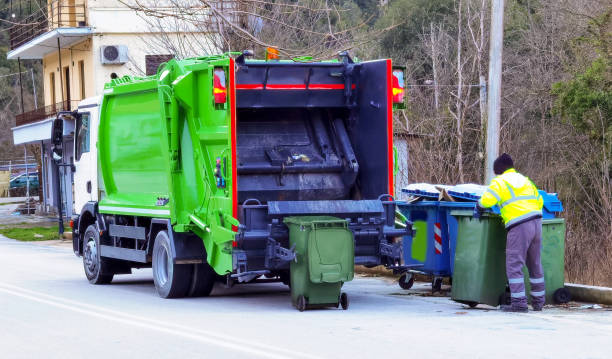Almost every area of life has experienced a radical transformation in this age of fast technological growth, and waste management is no exception. Using state-of-the-art technologies, garbage collection services today are leading the way in revolutionizing the way we manage and dispose of our waste. This article examines the significant influence of technology on modern waste collection services, looking at technologies that improve the efficiency and sustainability of the environment while also expediting the process.
1. Smart Bin Technology:
One of the most noticeable advancements in garbage collection services is the integration of smart bin technology. Traditional waste bins are being replaced by intelligent counterparts equipped with sensors that can monitor waste levels in real-time. These sensors transmit data to a central system, enabling garbage collection services to optimize collection routes and schedules. This not only reduces fuel consumption and emissions but also ensures that bins are emptied only when necessary, enhancing operational efficiency.
2. Route Optimization Software:
Efficient route planning has long been a challenge for garbage collection services. However, with the advent of route optimization software, this challenge is being met head-on. Advanced algorithms analyze data from various sources, including smart bins, historical collection patterns, and real-time traffic conditions. The result is a dynamically optimized collection route that minimizes travel time, fuel usage, and environmental impact while maximizing the productivity of the collection service.
3. Internet of Things (IoT) Integration:
The Internet of Things (IoT) has permeated every facet of modern life, and waste management is no different. Garbage collection services are increasingly incorporating IoT devices into their infrastructure. These devices can monitor and manage waste containers, providing data on fill levels, temperature, and even the type of waste being generated. IoT integration allows for a more granular understanding of waste patterns, enabling collection services to tailor their strategies to specific needs and optimize resource allocation.
4. Automated Sorting Systems:
Conventional garbage sorting has always required a lot of effort and was prone to mistakes. On the other hand, automated sorting methods greatly improve accuracy and efficiency, thanks to technological advancements. These systems distinguish and segregate various waste products using a mix of robotics, artificial intelligence, and sensors. Garbage collection services can help promote more environmentally friendly waste management techniques by increasing recycling rates and lowering the contamination of recyclable items through the automation of the sorting process.
5. Fleet Management Solutions:
The management of a garbage collection fleet is a complex task involving numerous vehicles, routes, and schedules. Fleet management solutions powered by technology have emerged as a game-changer in this regard. These systems offer real-time tracking of collection vehicles, monitor fuel consumption, and provide insights into vehicle maintenance needs. By optimizing fleet operations, garbage collection services can minimize downtime, reduce fuel costs, and enhance overall service reliability.
6. Mobile Apps for Enhanced Communication:
In the age of smartphones, mobile applications have become powerful tools for improving communication between garbage collection services and the communities they serve. Many services now offer dedicated apps that allow users to receive collection schedules, report issues such as missed pickups, and access information on proper waste disposal practices. This direct and instant communication not only enhances customer satisfaction but also facilitates a more collaborative and informed approach to waste management.
7. Predictive Analytics for Waste Trends:
Predictive analytics, driven by machine learning algorithms, is increasingly being employed by garbage collection services to forecast waste generation trends. By analyzing historical data and considering variables such as population growth, seasonal variations, and economic activity, these systems can anticipate future waste volumes. This foresight enables services to proactively adjust collection strategies, allocate resources efficiently, and respond to changing waste patterns in a timely manner.
8. Blockchain for Transparent Waste Tracking:
Blockchain technology, known for its transparent and tamper-proof nature, is finding applications in waste management. Garbage collection services are exploring the use of blockchain to create immutable records of waste transactions from collection to disposal. This not only enhances transparency but also aids in tracking the entire lifecycle of waste materials. By providing a verifiable and auditable record, blockchain contributes to accountability and trust in waste management processes.
9. Drones for Surveillance and Monitoring:
Drones, equipped with cameras and sensors, are being employed for surveillance and monitoring in waste management. They offer a bird’s-eye view of landfill sites, collection routes, and other critical areas, providing valuable data for decision-making. Drones are particularly useful in assessing the condition of landfill sites, detecting illegal dumping activities, and monitoring the overall environmental impact of waste disposal practices.
10. Robotics in Collection and Disposal:
The integration of robotics into garbage collection services is a frontier that holds immense potential. Robotic systems can be designed to autonomously collect and dispose of waste in designated areas. This not only reduces the physical strain on human workers but also enhances the overall efficiency of waste collection. As technology continues to advance, the deployment of robotic solutions in waste management is expected to increase, further optimizing the entire process.
Conclusion
The role of technology in modern garbage collection services is pivotal, with innovations spanning from smart bins and route optimization to advanced sorting systems, IoT integration, and blockchain applications. These technological developments not only improve waste management’s efficacy and efficiency, but they also make a substantial contribution to the sustainability of the environment. The garbage collection services’ continued adoption and utilization of emerging technology portends even more revolutionary advancements in waste management, redefining our approach to addressing waste in our constantly changing environment.


